Henry Taylor
Contributors
- Dario Cifuentes
- Mckayla Cooper
- Kayci Griffin
Reviewers
- Henry Taylor, RN, BSN, MPH
- Sean N. Bennett, RN, MSN - Associate Professor - Utah Valley University
- Troy Nelson, RN, MSN, APRN - Associate Professor - Utah Valley University
Home and Family
Henry Taylor was born May 2, 1982, in Motootua, Apia, Island of Upolu in Western Samoa. He was welcomed to the world by his mother, Epenesa Luamanuvae Fepuleai Tuimaseve Fuea, and his father, Taylor Pulusi. His mother grew up in Vaitoloa, Apia, while his father was in Pata Falelatai Apia. While they were still together, his mother was a stay-at-home mom, and his father worked as a painter. They were divorced and both remarried. His mother remarried Tuimaseve Fuea, who is a member of Parliament. His father remarried and moved to New Zealand. Henry is ninth of ten children.
- Iosefa (M)
- John (M)
- Fitai Feula (M)
- Lovely Lino (twin1/F)
- Leonia (twin2/F)
- Palamo (M)
- Aveina Suilagi (F)
- Tulia Nia (F)
- Henry
- Junior (M)
- Principles of Body Functions
- Concepts in Nursing
- Anatomy and Physiology
- Introduction to Psychology
- Introduction to the Process of Nursing
- Nursing Practice 1
- Intro to Samoan History
- Intro to Anthropology and or
- Samoan Social Organization (NUS, 2015)
- Nursing Process and Critical Reasoning 1.
- Nursing Practice 2.
- Mental Health and Mental Illness.
- Pharmacology in Nursing.
- Nursing Process and Critical Reasoning 2.
- Nursing Practice 3.
- Primary Healthcare.
- Health and Environment. (NUS, 2015)
- Reproductive Health
- Nursing Practice 4
- Ethic-Legal Aspects of Nursing
- Research in Nursing (NUS, 2015)
- Management in Nursing
- Nursing Practice 5
- Community Health Nursing
- Introduction to Psychology
- Samoan Social Organization
- Nursing Process and Critical Reasoning 1
- Nursing Practice 2
- Mental Health and Mental Illness
- Pharmacology in Nursing
- Nursing Process and Critical Reasoning 2
- Nursing Practice 3
- Primary Healthcare
- Health and Environment
- Reproductive Health
- Childbearing
- Nursing Practice 4
- Ethico-Legal Aspects of Nursing
- Research in Nursing
- Management in Nursing
- Nursing Practice 5
- Community Health Nursing (NUS, 2015)
- American Samoa Jurisdiction Executive summary. (n.d.). Retrieved August 4, 2022, from https://www.cdc.gov/vaccines/covid-19/downloads/american-samoa-jurisdiction-executive-summary.pdf
- Allen, L. B., Taylor, F. H. H. T., Kauwea, A. I., Larsen, T., Hippen, A. A., Allen, M., & Kauwea, J. S. K. (2017, February 2). Using the health belief model to evaluate Samoan caregiver perceptions for rheumatic heart disease follow-up care. Taylor & Francis. Retrieved June 26, 2022, from https://www.tandfonline.com/doi/full/10.1080/14635240.2016.1250661
- Belluz, J. (2019, December 18). Tiny Samoa has had nearly 5,000 measles cases. Here's how it got so bad. Vox. Retrieved June 26, 2022, from https://www.vox.com/2019/12/18/21025920/measles-outbreak-2019-samoa
- Blair, J. (2018, January 10). A problem in Paradise. Yale School of Medicine. Retrieved August 11, 2022, from https://medicine.yale.edu/news-article/a-problem-in-paradise/
- Cassel, K. D., Braun, K., Ka'opua, L., Soa, F., & Nigg, C. (2014). Samoan Body and Soul: Adapting an Evidence-Based Obesity and Cancer Prevention Program. Qualitative Health Research, 24(12), 1658-1672. https://doi.org/10.1177/1049732314549021
- Fruean, A. (2020, July 20). Book launch pays tribute to Nurses and Midwives. Samoa Observer. Retrieved June 26, 2022, from https://www.samoaobserver.ws/category/samoa/66975
- Government, S. (2018, February 1). Log into Facebook. Facebook. Retrieved June 29, 2022, from https://www.facebook.com/samoagovt/posts/tuasivi-hospital-improves-health-care-services-press-secretariat-getting-the-tua/1748314375199577/
- Kaspar, A., Pifeleti, S., & Whitfield, B. C. (2020). The measles emergency is over, but the crisis continues - a call to action for the Pacific Islands. Journal of global health, 10(2), 020301. https://doi.org/10.7189/jogh.10.020301
- Los Angeles Times. (2007, May 16). Malietoa Tanumafili II, 94; King of Samoa for more than four decades. Los Angeles Times. Retrieved August 11, 2022, from https://www.latimes.com/archives/la-xpm-2007-may-16-me-tanumafili16-story.html
- H., M. O. (2022). Ministry of Health. Retrieved August 12, 2022, from https://www.health.gov.ws/
- Nus homepage. National University of Samoa. (2015, January 10). Retrieved August 11, 2022, from https://nus.edu.ws/
- Ritchie, H., Mathieu, E., Rodes-Guirao, L., Appel, C., Giattino, C., Ortiz-Ospina, E., Hasell, J., Macdonald, B., Beltekian, D., & Roser, M. (2020, March 5). Coronavirus (COVID-19) vaccinations. Our World in Data. Retrieved June 25, 2022, from https://ourworldindata.org/covid-vaccinations?country=WSM
- Tagatapasifika1. (2020, April 10). Covid-19: Samoa in lockdown. YouTube. Retrieved August 7, 2022, from https://www.youtube.com/watch?v=6i71WUnu2sI
- Wilson, S. (2019, November 10). Australian group here to help Samoa fight measles. Samoa Observer. Retrieved June 25, 2022, from https://www.samoaobserver.
- World Health Organization. (n.d.). Samoa's two-day vaccination lockdown helps to boost coverage. World Health Organization. Retrieved August 7, 2022, from https://www.who.int/vanuatu/news/feature-stories/detail/samoa-s-two-day-vaccination-lockdown-helps-to-boost-coverage
Henry says, "I'm very close to my siblings, I consider myself a role model, and I do anything and everything for my siblings. I'm a momma's boy. I would say everything was for her when she was alive, and up until now, I do everything in remembrance of her."
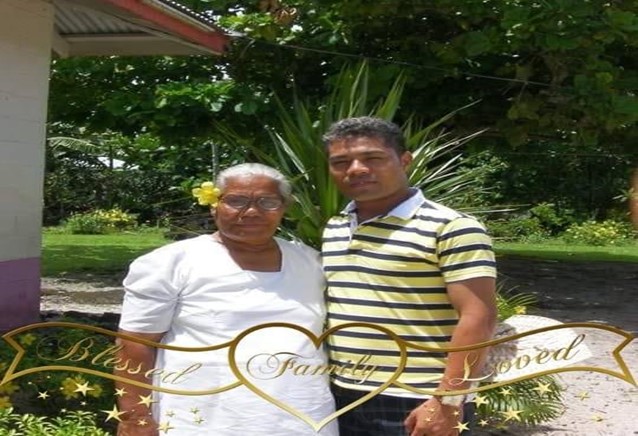
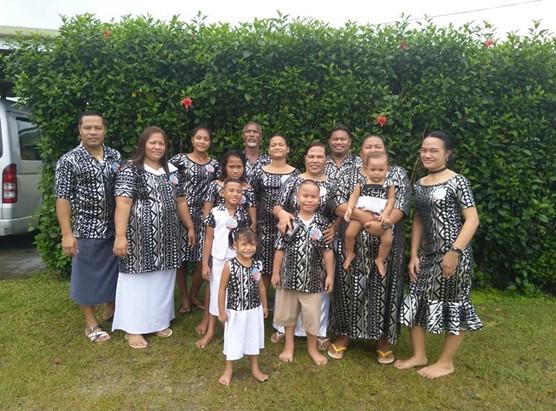
Schooling (Primary-University)
Primary School
Henry attended Lepea Primary School, from ages 1-8, in the village of, Upolu Apia. His favorite subject in school was learning English. He loved the comparison of the pronunciation between English and Samoan. When Henry was young, he always wanted to be a teacher. During his young school age, he describes his favorite activities as "Tree Climbing, getting hurt, and playing outdoors and enjoying his mother's cooking." Henry had a best friend growing up named Owen Ah Ching, and they still keep in touch. He says they are much more mature now but remain friends.
Nursing School
Henry attended the only nursing school in Samoa, the National University of Samoa in 2000 and graduated that same year with a certificate in nursing. Once certified, he had the option to work as a nurse's aide or continue his studies for the following three years to become an R.N. Desiring to help care for his family financially, Henry wanted to continue his studies but worked as an enrolled nurse/nurse's aide in 2001 where he could make a maximum salary of $7000 Tala per year ($2586.88 USD). As a nurse's aide, Henry was vigilant and passionate about performing anything required of him. They were short-staffed, so he had many opportunities to work and learn things he never knew about nursing. Being well loved by his superiors and managers, Henry was recommended for the new Bachelor of Nursing program launched in 2002 by the National University.
This University was established in 1984 by an act of Parliament. The first class of 45 students graduated with a Bachelor of Education in 1987 (NUS, 2015). After years of growth, the already existing School of Nursing by the Department of Health merged to create the University's Bachelor of Nursing program. There are structures and guidelines that students must follow to be admitted to the nursing program. The admission process goes as follows, "An applicant shall be eligible to be admitted to the Bachelor of Nursing if that applicant has: a) Foundation Certificate (Nursing) or Foundation Certificate(Science) or equivalent or b) Passed the Diploma in Nursing 100 level courses with not less than 65% in each course or c) On account of age, academic background and the nature of his/her employment or occupation, a reasonable chance of completing the program, or d) Qualified for Admission with Standing � see Statute on Recognition of Prior Learning/Credit," (NUS, 2015). The program consists of 24 courses completed in 3 years. Their program offers two tracks: full-time (4 courses per semester) or part-time (2 courses per semester) (NUS, 2015).
Year 1 consists of:By the end of year 3, students can graduate with a Bachelor of Science in Nursing. Students who are admitted under 1(d) as stated above, can complete the program in 18 courses. (NUS, 2015)
These consist of:During Henry's nursing program, he described his favorite parts: the nursing clinical, where he could put theory to practice. Even though they only had certificates, Henry and three other juniors were accepted into the program in 2002 alongside ten seniors R.N.s. The latter had worked for the Ministry of Health for over ten years. During his time in the program, Henry didn't have many instructors, so he often would be taught by the same ones and would be taken to clinical and supervised by the nurse manager on duty. Clinicals were every Friday, and they would work as general nurses wherever they were needed, but his favorite was surgery and emergency medicine. When he was in school, there were so few nurses they didn't specialize because the hospital needed nurses everywhere. During his time in school, Henry would work during his semester breaks at the beginning and end of the year. He was a good student, President of the Faculty of Nursing and Health Science, and Secretary of the National University of Samoa Student Association in 2004. Henry was nominated to make a graduation speech in 2005. He attributes his success in school to God and his mother, who was his "prayer warrior." He completed his program in 3 years (2002-2004) and became an R.N. after a year-long orientation program to all health facilities in Samoa. After finishing school and becoming an RN, Henry worked as a general nurse. General nurses tended to the areas that needed the most help. Henry says that if he could go back in time and tell himself something during nursing school, it would be to give himself all the knowledge and experiences he has had now. It was very hard with the limited resources back then, but to him now, it is all effortless.
Graduate School
Henry later went on to get his Master's in Health Science at Ryukyu University, Okinawa, Japan, from 2009-2011. This University was established in 1950 on the remains of Shuri Castle, which was burnt down in the Okinawa battle. In 1972, Ryukyu University became a National University of Japan after the United States relinquished Okinawa (The University of the Ryukyus, 2020). As of 2019, the University has seven faculties- 32 programs, nine graduate schools- 23 programs, has just over 8,000 enrolled students, of which 300 are exchange students, and has partnerships with 121 universities in 42 countries/regions. Ryukyu's Health Science mission statement is "Health science is a discipline related to maintaining good health, looking at illness and the environment around it. We are researching to improve health without leaving behind vulnerable groups such as women and children with poverty and disabilities, related adolescent issues, and the increasing number of older adults. We have a nurse/expert training course specializing in cancer nursing and a school health/health promotion (nursing teacher specialization license) course. We are developing highly specialized human resources who can contribute to the community. In addition, innovative advances in biotechnology and information technology are innovating health promotion. We are also actively engaged in the implementation of this cutting-edge research," (The University of the Ryukyus, 2020). The Master of Health Science program was established in 1986 as the second graduate school of health sciences at a national university to open. Learning about health development and international island health takes education and research. "Through these, we plan our research from multiple perspectives, analyze the results precisely, scientifically interpret and develop logic, and aim to acquire the ability to innovate," (The University of the Ryukyus, 2020). Henry's journey to becoming one of Samoa's youngest and highest educated nurses will be remembered by many as a great accomplishment.
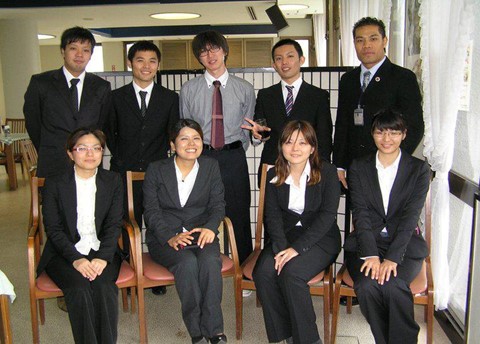
Nursing Sentiment
When asked why he chose nursing, Henry says, "For me, nursing is a life I didn't choose; it chose me. I am honored to be a male nurse exemplifying inclusion, strengthening the nursing profession, and improving the overall quality of care for our diverse patient population in a historically female-dominated profession. I am a man with ordinary ability who has worked hard, but that is all. Humbled, honored, and above all blessed to serve the people of Samoa, God has led me in strange and unaccustomed paths to do His service; all glory be to Him!" Henry is a very passionate, humble nurse.
When Henry has time off from work, he helps and contributes to daily activities and planning for his team. Even when he is not working, he does what he can to ensure his country gets the best care. Henry describes his best strength as the strength that God gives him. Henry never planned to become a nurse, but as he said, "Nursing is a job I didn't choose. It chose me." Henry strives always to be transparent and do his part as a teammate and leader. Henry spends most of his time leading from an office, where he can communicate with staff and observe and implement other needed developments in different areas. However, Henry never gives up a chance to jump into the field to get some hands-on cases. He strives to keep his practical experience in top shape, which has helped him to become very versatile.
Present Day Responsibilities
Henry oversees 160 nurses, 4 district hospitals, clinics and one main referral base hospital on the Island of Savai'i with a population of 47,886. Henry wears his stripes proudly on his uniform. A strip represents five years of nursing service. In Samoa, if you have a post-doctorate degree, you can get three stripes even if you haven't completed your five years of service. And, if you are a leader in the hospital, such as a manager, you can get four stripes immediately. This honor is only given to the leadership team.
For Henry and his regular schedule, Mondays and Tuesdays are always very busy, depending on what's happening in the community. But much of their time and focus is on primary health care and public health because their population is used to waiting until sickness or injury is severe before they seek help from the hospital. Their efforts help people be healthy and whole before going to the hospital. He never thought he would be where he is today and has gone so far in nursing. Henry has the opportunity to work in leadership positions and the field and has loved opportunities to do both. This helps him to be involved in every aspect. He also enjoys communicating with staff and seeing areas that need improvement.
In 2017, Henry had the opportunity to publish a paper in the International Journal of Health Promotion and Education, Vol. 55, Issue. 3, 2017. "Using the Health Belief Model to evaluate Samoan caregiver perceptions for Rheumatic Heart Disease follow-up care." which was a joint effort by Utah Valley University, Brigham Young University, the Samoan Ministry of Health, the Samoan National Health Services, and the Rheumatic Rescue Organization. This partnership focused on Samoa. The research project continued for about five years, and the results varied from the different parts of Samoa. The locations of the follow-up appointments were one of the factors due to many citizens of Samoa don't drive and relying on public transportation. As well as how the caregiver perceives the child's sickness from Rheumatic Heart Disease gives excellent insight into the connection involving the caregiver to seek adequate follow-up treatments for the patient in Samoa. The difference in the therapy follow-up was the need for the caregiver to be included in the discharge education. As well as follow-up visits within the first 12 months after the treatment. The results validated the development of a new structured Rheumatic Heart Disease Health Promotion Program for Samoa (Allen et al., 2017). The treatment for these young patients included a monthly injection of antibiotics for five years to control the infection and defeat the disease.
The study results indicated that the research team needs to give "the caregiver the knowledge, frequency, and location for follow-up treatment" (Allen et al., 2017).
"This validates the need to educate the caregiver" (Allen et al., 2017). Henry's passion for helping his community of all ages is a prime example of advocating for his patients.
Savai'i island hospitals and M.O.H. staff training
Tuasivi Hospital is the leading medical facility in Savai'i. The formal name for the hospital is Malietoa Tanumafili II after the king of Samoa which was one of the longest- reigning monarchs (L.A. Times, 2007). It is located on the east coast of the Island. It's a public hospital with about 20 beds and a few doctors. Recently the Tuasavi's facility received a 6-million-dollar renovation funded by New Zealand, Australia, and The World Bank. This major project has allowed the residents of the Island of Savai'i to receive quality care. The new services of the hospital include a comprehensive Eye clinic, Dental Clinic, Pharmacy, Medical record room, Emergency room, Maternity ward, and Community service rooms. The Malietoa Tanumafili II hospital will soon add 30 beds as soon the plans are ready to go forward.
A new digital X-ray machine has been installed on February 2, 2018. That is complemented with Ultrasound services for expecting mothers. In addition, state-of-the-art Lab Services can help physicians get faster results to give better care to residents of Tuasivi and the local villages. The new amenities are reinforced with community service in mind. The program is designed to provide the community with access to hospital staff to inquire about health tips and lifestyle changes to better the residents (Government, 2018).
Measles Epidemic
In 2019 Samoa had a Measles outbreak. It shut down schools, banned social gatherings, and stressed the Ministry of Health with the tidal wave of new measle cases. The accidental death of two children due to a vaccination-medication error didn't help them in this situation (Belluz, 2019). The parents had to be skeptical about vaccinating their children against measles. Because of this error and resulting tragedy, the government halted the measles vaccine campaign for ten months while teams investigated this error. This created a domino effect, increased the chances of infection, and decreased herd immunity (Belluz, 2019). Then (2018), only 31% of Samoa had a single dose of the vaccination against this virus, which was not even the worst of the outbreak which happened in 2019 (Belluz, 2019). After much effort to vaccinate and eradicate this virus from the country, the Ministry of Health lifted the state of emergency on December 29, 2019. After a study, WHO/UNICEF concluded that 83 people had died from measles, 87% being children under the age of 5, and a total of 5,687 recorded cases with 1860 measles-related admissions (Kaspar et al. 2021). The efforts of many countries helped the Nurse Specialist vaccinate the community so the protection of herd immunity could slow down the spread of this virulent disease that took the lives of so many.
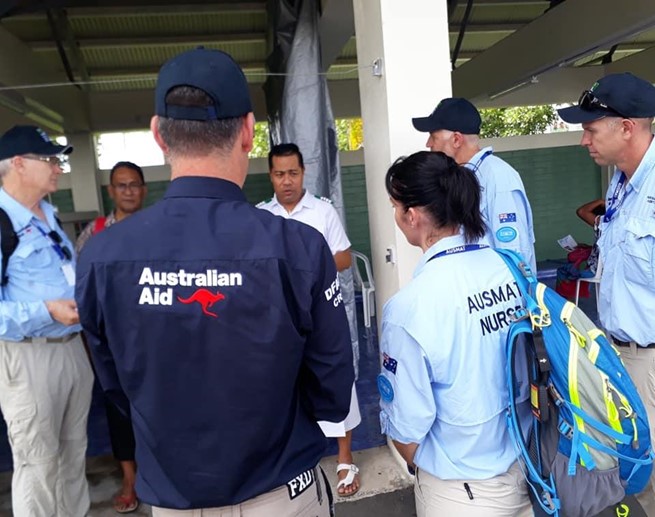
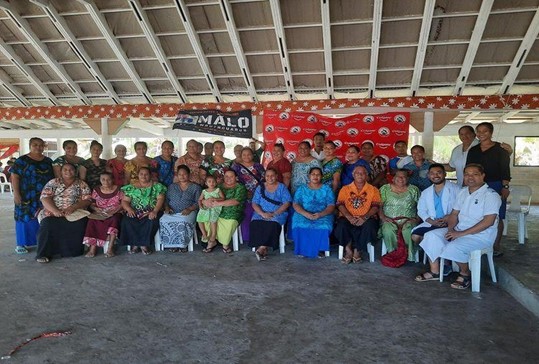
The efforts are vividly seen in newspapers and the many articles printed on the measles outbreak and for a tooth brushing celebration in Samoa. With all the uncertainty of emergencies or natural disasters, Henry and his team put together kits and bags prepared to take throughout the community during emergencies. With great proactiveness also comes the responsibility to keep up on these packs. Ensure they are all up to date with medications, food, etc. This does take time to refill when things expire.
In 2020 Henry's work didn't go unnoticed as he told his story in The Society of Private Nurses and Midwives book that pays tribute to the creation of nurses and midwives in Samoa (Fruean, 2020). The Society of Private Nurses and Midwives commissioned a book to pay homage to the work of nurses and midwives in Samoa. The Society's constitutional objectives were also outlined in the book:" to pursue the 'Health and Wellbeing' focused approach for strengthening and improving access to integrated people-centered primary health care [P.H.C.] and health promotion [H.P.]." Additionally, to advance community health, they hope to advocate health promotion and teach health principles in their Society. This book was a "year-long effort to celebrate the work of nurses and midwives globally and highlight their achievements in every sector, workplace or setting, where they are providing vital health services and care." The book has stories dedicated to the heroic work and lives of many nurses and midwives across Samoa striving to bring proper healthcare to their people and help create a public health sector. While many of the nurses and midwives highlighted are women, Henry Taylor stands to show that nursing in Samoa has a place and is a necessity for men to step up and serve their community.
Telling his story, Henry said
"When I think about all the patients and their loved ones I have served over the years, I may not remember all of them and may not remember me. But I do know I gave a small piece of myself to them, and they gave to me; together, we have created a rich and beautiful tapestry that serves as a reminder of the fundamental humanity inside all of us."
In his early thirties, as one of the Senior Nurse specialists at The National Health Services in Samoa. His role in the Ministry of Health is to educate and care for the citizens of the Island of Savai'i. The population was 43,958 in 2016, approximately 24% of the national population. The Ministry of Health and the nurse specialist team aim to vaccinate as many as possible. Henry is breaking the stigma of nurses caring for a handful of patients. His handful is over 40,000 lives.
Covid-19
Not even six months after a deadly measles epidemic that claimed the lives of over 80 people in Samoa, the coronavirus posed another fatal threat to this island nation. When COVID-19 began, Samoa had a strategy to combat the threat of this virus. As noted by Leausa Dr. Take Naseri, the C.E.O. of the Ministry of Health of Samoa, although under-resourced, Samoa has "doctors and identified teams to respond, [...] strategies to make sure [they] can last this, and [they have] been piling up supplies in anticipation of having [their] first case and the expected rise". However, that was at the beginning of the virus in 2020, where he acknowledged, "it's just a matter if we can last because this might prolong. So, we are anticipating 6 to 9 months, but after nine months, we might not be able to last with the supplies," (Tagatapasifika1, 2020).
Now over two years later, despite many lockdowns and measures taken, the pandemic is still threatening the people on the Island of Samoa. Driven by the fear of a repeat of the measles epidemic, much was unknown about the coronavirus except that, unlike measles which primarily threatened young children, no one was immune or safe from COVID-19. Samoa was one of the first countries in the pacific to enforce border security measures which dramatically slowed the emergence of the deadly virus in the country. Samoa closed its borders in the beginning days of the pandemic in 2020. Citizens outside the country were not allowed to return, and nonresidents were not allowed into the country (WHO, 2021). The result was zero cases of Covid-19 in Samoa between February 2020 and May 2022. And while this saved lives, it has had detrimental effects on one of the most significant sectors of Samoa's economy, tourism, where over 4,000 jobs have been lost. There were no flights in and out of the country, interisland ferries, school shutdowns, market and shop restrictions, banned public gatherings, and no church services (Tagatapasifikal, 2021). The impact of COVID is more far-reaching than simply physical health. The Samoan people were called to sacrifice in the name of health and safety in their country, and if they did not comply, they were fined or arrested. Within weeks of the Islands of Samoa reopening its border, in May 2022, the country was hit with a wave of Covid-19 cases. As of June 15, 2022, Samoa was faced with 14,442 confirmed cases of Covid-19 in a matter of weeks. The responsibility of keeping people healthy on the Island of Savaii was his primary responsibility.
Henry has been helping coordinate the vaccination of the people of Samoa against Covid-19. As with anywhere in the world, some were skeptical of the virus and vaccine in general, but Samoa's goal was to have a 95-100% vaccination rate. To achieve this goal, Samoa held a 2-day vaccination blitz country-wide lockdown. As many of their vaccines were set to expire at the end of November, the Ministry of Health knew they needed to get as many vaccines distributed as possible. Having learned from the measles epidemic, they mounted a two-day COVID-19 vaccination campaign in September 2021, where 770 people teamed up to vaccinate over 22,000 people in 20 hours of 2 days. In this blitz, Samoans are asked to stay home, and if they need vaccinations, they are asked to put a red cloth, flag, or piece of clothing outside, and the vaccination team will come to their house and vaccinate everyone eligible for vaccination. After this 2-day lockdown, 94.4% of its eligible population had received their first dose and 52.4% their second dose seeing a 12% increase in the first dose and 10% in the double dose in just this short period. They aimed to get the last 6-7% vaccinated by educating and dispelling myths and misinformation about the vaccine. And as of June 6, 2022, 438,313 vaccine doses have been administered. 99.9 % of the population (Ritchie et al., 2020). As the rest of the world is opening back up, these pacific islands are still fighting COVID-19 head, and Henry is at the forefront of the fight in Samoa (WHO, 2021).
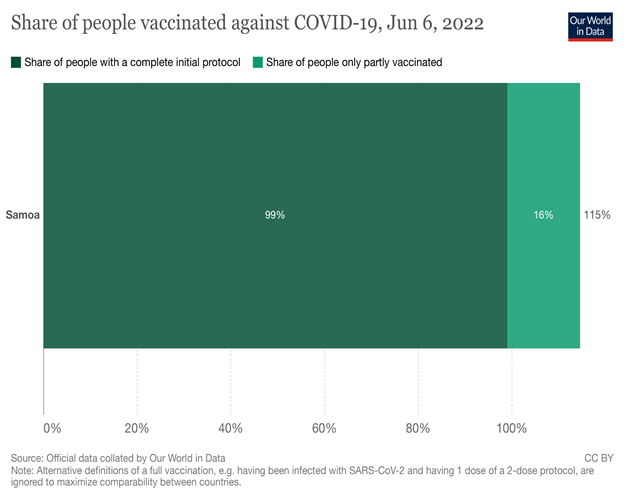
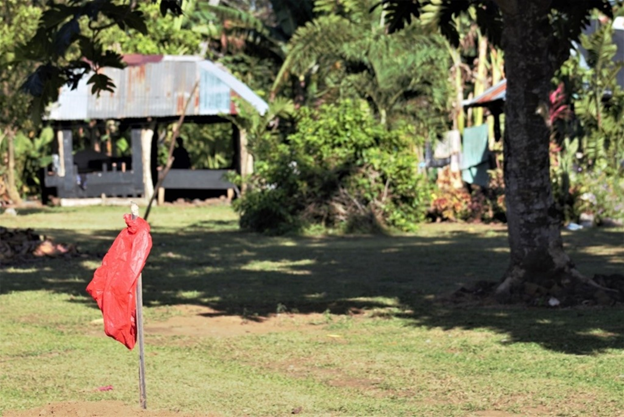
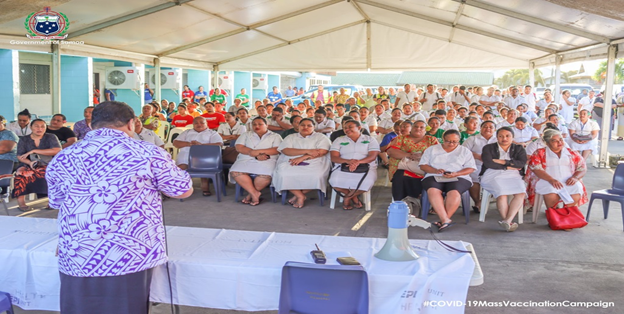
Savai'i has another three district hospitals and clinics on the perimeter around the Island: Safotu District Hospital, Sataua District Hospital, District Hospital, and Agia Manuia Clinic, all located on Coast Rd. (H., 2022).
The Ministry of Health keeps its senior nurse specialist well trained with various training that touch on different topics throughout the Island of Savai'i. They are spreading the message of healthy living from different district hospitals. In the picture shown, S.N.S. Henry Taylor speaks on the benefits and effectiveness of various forms of contraception for Family planning and birth spacing. The Ministry of Health also provides Community Health Awareness programs. They involve the Senior Nurse Specialist to take their team of nurses and teach the community on specific topics that are on the rise throughout Samoa. They go to the local schools and teach about nutrition, dental screenings, the harms of using tobacco, and vaccinations. The Senior Nurses and R.N.s are prepared, tested, and certified on the current science-based information. The constant pieces of training provide a solid foundation for patient care. Therefore, the community can have a better experience and care in the local hospitals throughout Samoa (H., 2022).
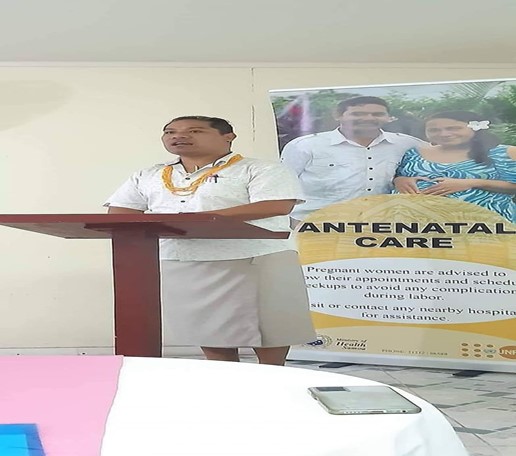
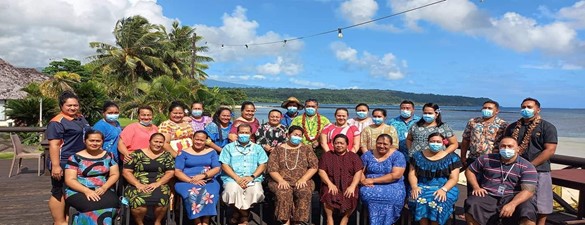
Samoa's health problems
Besides the outbreaks of measles and Covid, Samoa has other diseases that are sweeping through the country. Since introducing processed foods, the obesity rate has increased on the tiny pacific Island. Obesity or excess body fat impairs the community's health and increases the risk for long-term complications. As stated by Lameko, "heart disease, cancer, stroke, type 2 diabetes mellitus, and non-alcoholic fatty liver disease."
In 2020 59% of men and 81% of women were obese. The Nurses have their hands full when it comes to healthy lifestyle choices for the Samoan community (Blair, 2018). Unfortunately, the increased prices of fresh foods are making people buy the heavily processed foods that cause this radical increase in health concerns. "The traditional Samoan diet of staple vegetable root and tree crops, coconut, fish and other seafood, native birds, and more rarely, pork and chicken, as stated by Lameko. The diets have changed, but the lifestyles have also become less physical. The Ministry of Health and the team of senior nurse specialists are the last line of defense against this epidemic of obesity that has become a staple within the Samoan community (Blair, 2018).
Healthcare in Samoa
Healthcare in Samoa operations are funded primarily from Government allocation with a small amount (<5%) recovered from nominal charges to patients" (Devex, 2022).
It has several districts and two main hospitals available for people needing service. The Ministry of Health is in charge of addressing the growing problem throughout Samoa. The shortage of nurses and doctors makes it difficult to give adequate care to patients. The nurses are assigned what kind of nursing they will do and where they will be on the Island. The severe health issues in the community keep the medical personnel busy with minimal resources (Devex, 2022).
.Ministry of Health
The National Health Service was established on July 1, 2006, under the National Health Service Act 20061 (H., 2022). The establishment of Ministry of Health. as a state-owned public beneficiary body separated the health service delivery functions from the Ministry of Health, which now focuses on health sector strategic planning, policy development, and monitoring (H., 2022).
The Ministry of Health provides healthcare to the people of Samoa. They operate all of the publicly funded hospitals and health centers. They are also the primary medical imaging and laboratory testing providers and cater to a significant portion of national pharmaceutical needs. As one of the largest government organizations with just over 1,000 employees in 2015, delivering healthcare services from 2 hospitals and ten health centers located over the two main Islands, Apia and Savai'i. Our health care model encompasses service delivery within the home and community settings (H., 2022).
Conclusion
From being number 9 out of 10 kids to being a nurse leader in the hospitals, Henry has impacted many lives in Samoa. His faith in God has led him into the nursing profession, where his skills have progressed and are widely utilized. Henry, from the beginning, was a good student and was accepted into the program with only a certificate for being a nurse's aide. He was one of the very few juniors accepted into the program. He was well loved throughout school and gained leadership qualities that have aided him in his roles and responsibilities in his work today. After Henry graduated as an RN, he continued his studies and received his master's degree. He is the youngest RN to have his MSN in Samoa. He is constantly involved in improving the healthcare in his country and serving his people. When he is not working, he is still working. His perseverance and impact do not go without recognition. Henry has had many opportunities to help educate people about health and how to maintain a good healthy life, practice hands-on skills, and lead his team to become better health professionals. Henry's work will continue as Samoa's health issues grow and evolve.